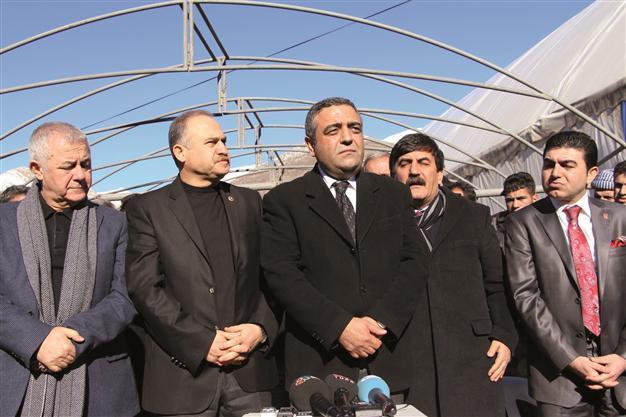Analysis: CHP trying to mend fences with the Kurds
ISTANBUL

CHP deputy leader Sezgin Tanrıkulu (R) and Ankara MP Levent Gök are seen at a press conference in Uludere. AA photo
While the Uludere tragedy, which claimed the lives of 34 Kurdish civilians, has dealt a serious blow to the standing of the ruling Justice and Development Party (AKP), it seems to have helped the main opposition party mend fences with the southeast.
But the Republican People’s Party (CHP) has a long way to go before its popularity gets anywhere near that of the AKP or the pro-Kurdish Peace and Democracy Party (BDP). Its challenge is not only limited to the difficulty of improving an image that has been tarnished for years but also includes the need to counterbalance reactions from its Western constituencies, which include hardliners on the Kurdish issue.
“This is a very important turning point,” said opposition member Sezgin Tanrıkulu, of the tragedy that took place last year in Uludere, near southeastern Şırnak. Thirty-four civilians, who were smugglers, who were supposedly believed to be terrorists, were killed in an aerial raid by the Turkish Air Force. “People are saying, ‘We gave our votes to you, but you have done this to us. This is representing a break [from the AKP],” said Tanrıkulu, who headed a CHP delegation last week to commemorate the tragedy that took place in what the locals call Roboski in Kurdish.
“There is a huge difference in the outlook toward the CHP since Kemal Kılıçdaroğlu took the seat of chairman,” several members of the party’s local administrations, who accompanied the delegation, told the Hürriyet Daily News. “Senior AKP figures cannot walk in the streets of the southeast without body guards. When Kılıçdaroğlu came to Diyarbakır he walked on the streets without any problem,” said one of them.
“Prior to Kılıçdaroğlu’s chairmanship, nobody wanted to listen to us. We were even insulted. Today at least, people listen to us,” they said. But many complained about anti-Kurdish or ultranationalist rhetoric used by high-level party members. “Our months-long hard work and whatever slight progress we achieve is nullified by one sentence uttered by our chairman or a hardline MP.”
Criticisms against Kurdistan Regional Government head Masoud Barzani, for instance, resonate negatively in the region. What is worth noting, however, is that local party officials have been frank in voicing criticism when they meet Kılıçdaroğlu. “I told him that Barzani is my honor,” said an official from the CHP’s Urfa administration.
“We need a unified rhetoric,” said Çınar Öktem, the CHP’s provincial head in Şırnak.
Despite an improvement of the image, raising the CHP’s votes significantly remains mission impossible, according to provincial heads.
“There is a line of thinking that says no matter what we do will not get votes in the east and on top of it we will lose votes in the west,” explained Gülseren Onanç, the CHP’s vice chairman, who was present in the delegation. “I am not convinced this is necessarily the case,” said Onanç, whose use of the word “guerilla,” for the outlawed Kurdistan Workers’ Party (PKK) members in a newspaper interview has sparked reactions within her party.
“It is not the Kurds that left the CHP; it is the CHP that has left the Kurds,” said a local CHP member. “And we all know that without the CHP there cannot be a solution to the Kurdish problem,” was a view shared by two MPs present in the delegation, both from İzmir, where the CHP’s constituency is known to be mostly constituted of hardliners on the Kurdish issue.
